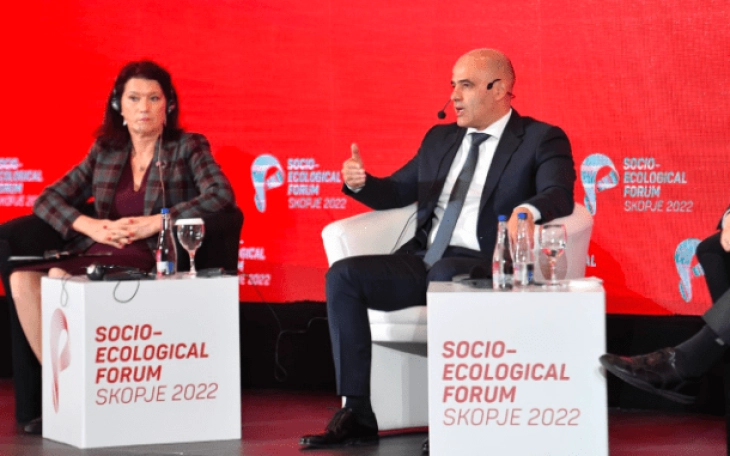Socially-just energy transformation should be based on solidarity, cooperation and investments, says Kovachevski

Skopje, 22 November 2022 (MIA) - Socially-just energy transformation of Europe should be based on three principles cooperation, investments and solidarity, Prime Minister Dimitar Kovachevski said on Tuesday.
Addressing the panel discussion on socially-just transformation for energy self-sufficient Europe within second Socio-Ecological Forum, organized by Friedrich-Ebert-Stiftung (FES), Olof Palme International Center and the Progres Institute for Social Democracy, he spoke about what a social-ecological transition looks like in conditions of growing inflation, lack of energy and in conditions of work with facilities that were built during the period of socialist Yugoslavia.
“The biggest blow to the instability in the electricity market came after the Russia’s invasion of Ukraine. Since then, there was a shortage of energy sources in Europe, above all gas, on which the price and supply of electricity depend. From an electricity market which for many buyers practically said how much they needed and they determined the price of electricity now we are in a seller's market because there is a shortage of electricity and they determine the price normally on the stock market and how much and where the quantities will be delivered. In such conditions, what should be done, in my opinion, should be based on three principles, namely cooperation, investments and solidarity,” Kovachevski said.
He mentioned that the region went through a period of long transition from the former Yugoslav system, but also from the former socialist system of the Warsaw Pact, because the countries were either part of Yugoslavia or were part of the Warsaw Pact.
“Albania was even a more specific case of an isolated state, more like North Macedonia at that time in those 45 years, which puts them in a very difficult situation as well. All countries except Bosnia and Herzegovina and Croatia are dependent on electricity imports, ranging from 17% to 73% annually. They all produce electricity from old power units, which are based on lignite, which means that we cannot talk about ecology here and that the only access to gas they have is Russian gas,” Kovachevski noted.
He underlined that the country must provide electricity for the functioning of the economy, to the citizens, and that it be at an affordable price.
“If you have a price that they cannot bear, they will not be able to pay their bills, unpaid bills at the same time mean the illiquidity of the energy system and a lack of electricity,” Kovachevski added.
According to PM Kovachevski, the third thing is that in crisis conditions, it is always good to invest and use it as an opportunity for transformation. He added that these are the foundations on which the policies of all the states in this region are built.
“When you look at the inflation rate in the EU, the inflation rate in the region. It is the same. When you look at electricity shortages in the EU and here, they are the same. When you look at the price of electricity in the EU and in the region, they are the same. That means that even if they give us expertise, I don't know what would change. But what we all have to do together has been confirmed by the European Commission, especially President Von der Leyen, that cooperation between the EU and the countries of the Western Balkans can be achieved,” he said.
PM Kovachevski underscored that cooperation is key in the inclusion of the countries of the Western Balkans in the common market for the supply of gas and energy, in the aid package that was not intended only for the EU countries, but also for the Western Balkan countries.
He mentioned that this cooperation also applies to investments, because there are at least two paradoxes with the war in Ukraine.
“One is that the infrastructure that has been built for 50 years, which is the infrastructure from east to west for the transfer of oil. So, Nord Stream 1, Nord Stream 2, etc., they are practically non-functional. That is the first paradox. Existing infrastructure can no longer be used. The second paradox is that Russia, with its reckless and unjustified war in Ukraine, can no longer sell energy through that infrastructure, but must sell to the east, where there is no infrastructure. Now they will have to build infrastructure to the east, towards China, Pakistan, etc. And since we do not have the east-west infrastructure, we need to build south-north, north-south and west-east infrastructure,” Kovachevski stressed.
PM Kovachevski added that that infrastructure cannot be built within two years because it involves investments of billions of euros, but added that it can be done faster if we work together.
The panel discussion also included Martin Schulz, President of Friedrich-Ebert-Stiftung and former President of the European Parliament, PM of Kosovo Albin Kurti, Ann Linde, former Minister of Foreign Affairs of Sweden and Hristina Spasevska, energy expert and Vice Rector of Sts. Cyril and Methodius University.







